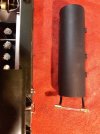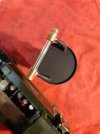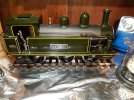Rhos Helyg Loco Works
Registered
I think I would like to be a l-o-n-g way away from it when you put a fire underneath it!Looks like copper to me. I was doubtful about the water gauge leads, too. But they're tight for the moment. Soft soldering for pot boilers is not unheard of under the assumption that enough water will remain to restrict temperature. I would not recommend it, though.
My plan is - by using a small but hot flame proceeding slowly - to flood with silver solder the gutter edge of what I shall call the upper crescent where there is no apparent trace of solder yet. I hope some strips of wet rags will suffice to protect the neighbourhood.
What do you think?
If you heat sufficiently for silver solder (red hot) and the gauge glass leads are only soft soldered then they will simply fall off, along with anything else that might not be attached in perhaps the way it should have been. Mixing soft and silver solder does not produce a safe joint, but keeping them apart would be very tricky.
Impossible to tell but knowing the form of the backhead would be very useful. Is it a properly flanged piece of copper, or just a disc? For a loco of this price bracket I would suspect the latter, much easier to make. A disc will not provide sufficient surface area for the solder, and may well be the cause of the leaks you are seeing if that is the case. I had a commercially (although I prefer the word comically) produced loco here recently that had *exactly* that problem. Deemed impossible to repair by a boiler maker friend of mine with decades of experience. The only safe solution was the inevitable brand new boiler.




